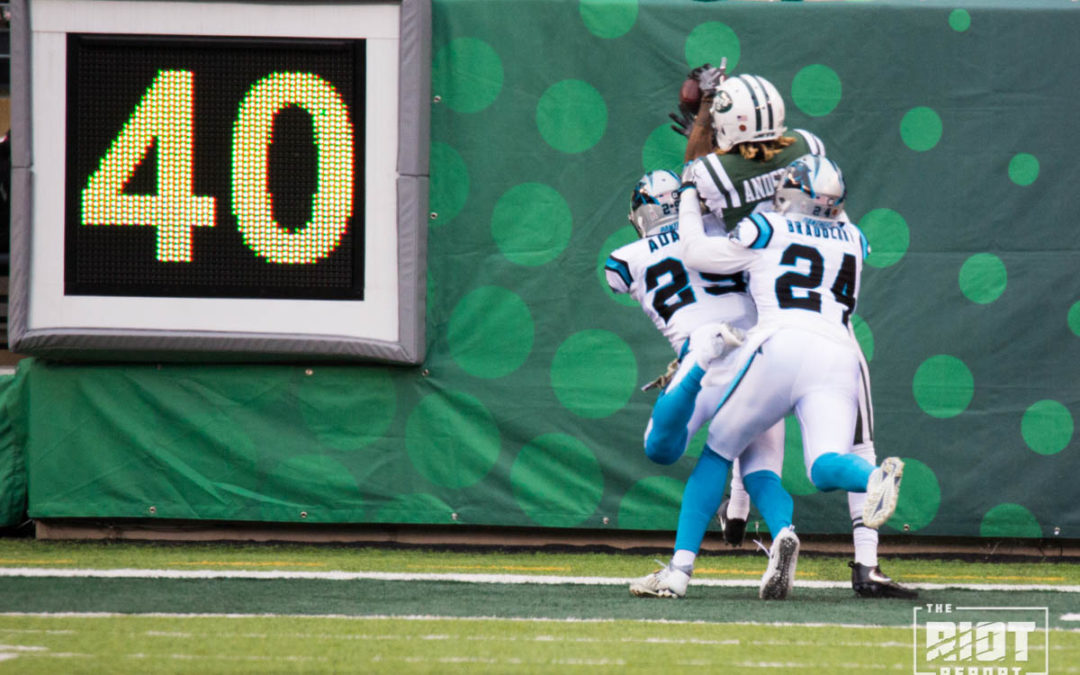The Panthers defense prides themselves on stopping the run, not giving up big plays, and creating turnovers. This week against the Jets, they were able to do two out of the three, and it was good enough to provide the team with just enough to beat a scrappy Jets team that refused to concede even when it appeared all of the momentum was with the Panthers as they scored two return touchdown in just over two minutes entering the fourth quarter to extend their lead to double digits. But while the Panthers certainly stopped the run, only giving up 109 rushing yards and extending their streak of not allowing a 100-yard runner to 15 straight games; and their only turnover was good enough for a Luke Kuechly touchdown that gave them a lead they would not relinquish, they didn’t hold true to the standard that may ultimately be the most important.
They gave up big plays. A few of them, in fact.
“I’m a little disappointed in our inconsistency, particularly the big, explosive plays that we gave up on the back end. That’s totally uncharacteristic of us and our play and the things that we do,” Steve Wilks said in his weekly press conference. “It’s something that’s very correctable, it’s more due to a little bit of eye discipline and those kind of things, but we’ll definitely get those corrected as we move forward.”
While Wilks called it ‘eye discipline’, the more fun phrase that has been thrown around the locker room the past few weeks has a much more interesting tone to it.
Dirty eyes.
Both Wilks and Ron Rivera have used the term when players in the secondary ‘peek’ at the quarterback to try and get a read of where the ball is going instead of keeping their eyes on the receiver, especially when a play breaks down, which was exactly what happened when Josh McCown rolled to his right in the third quarter on Sunday.
“His eyes are on the quarterback; he’s got the receiver, he’s in great position and he looks at the quarterback just as the wide receiver makes his move vertical. At that point, you know the quarterback’s scrambling, you locate your target and knock him out of bounds,” Rivera said when describing the breakdown in coverage that led to the 54-yard touchdown that put the Jets ahead 17-12. “Kurt knows better than that, he just got ‘dirty eyes’ on that play.”
‘Dirty eyes’ lead to breakdowns in coverage, which in turn leads to big plays for the opposition. While the Panthers were able to survive against the Jets, they might not be so lucky this Sunday against a quarterback famous for his ability to keep secondaries off balance.
“It just means keeping your eyes in the right spot and reading your keys, whether that’s the tight end blocking, the tight end releasing, or just getting your eyes to your man when you’re in man coverage.”
-James Bradberry
Drew Brees relies on his ability to get the ball out quickly and excels at punishing players that are caught looking in the backfield instead of keeping their eyes on their man. While Brees may not have racked up a huge yardage total in the Saints 34-13 blowout of the Panthers in September, he completed over 75% of his passes, including a 40-yarder to Ted Ginn, Jr. in the third quarter that put the game out of reach.
Brees starts the play looking left, but when he snaps his head back to the right and pump fakes, safety Mike Adams, who was looking at the quarterback the whole time, lunges in that direction. By the time Adams recovers back to Ginn, it’s already too late; the damage was done and the Saints were up by three scores.
“You’ve got to keep your eyes on the receiver,” explained Kevon Seymour. “It’s hard, but you’ve got to just keep reacting off of them.”
Watching Josh McCown caused mistakes in New York that ultimately didn’t add up to a loss for the Panthers. If the Panthers have ‘dirty eyes’ on Sunday, they may not be so lucky.


